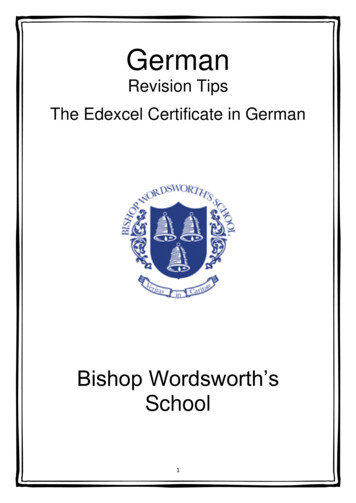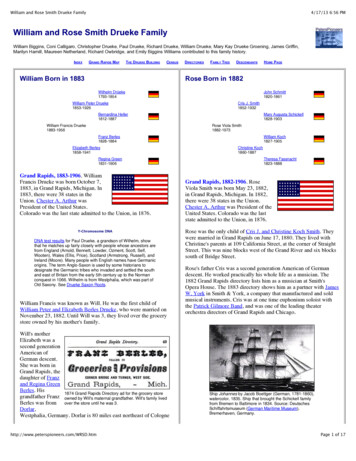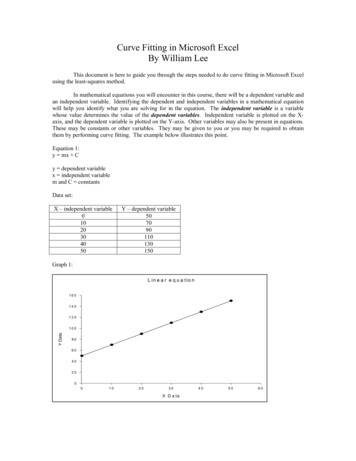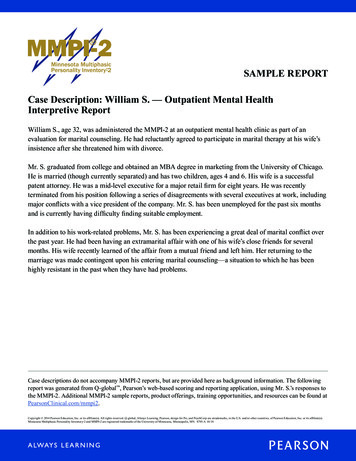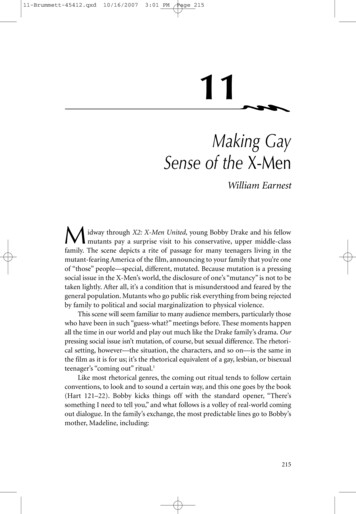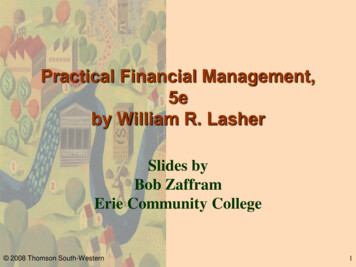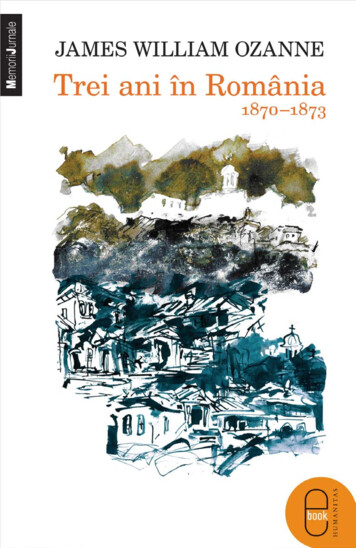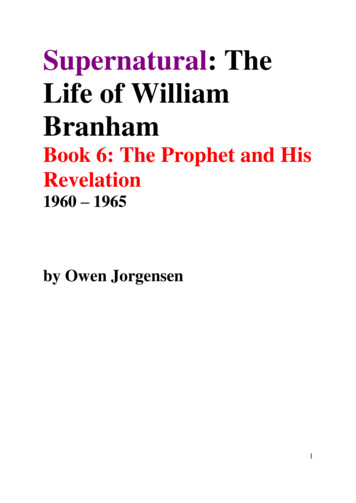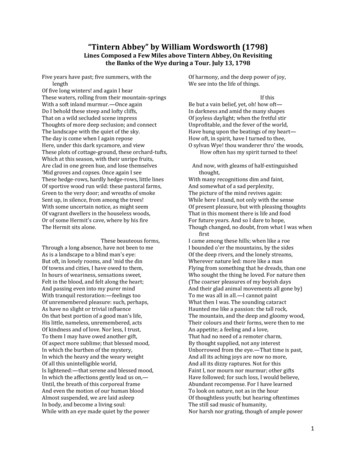
Transcription
“Tintern Abbey” by William Wordsworth (1798)Lines Composed a Few Miles above Tintern Abbey, On Revisitingthe Banks of the Wye during a Tour. July 13, 1798Five years have past; five summers, with thelengthOf five long winters! and again I hearThese waters, rolling from their mountain-springsWith a soft inland murmur.—Once againDo I behold these steep and lofty cliffs,That on a wild secluded scene impressThoughts of more deep seclusion; and connectThe landscape with the quiet of the sky.The day is come when I again reposeHere, under this dark sycamore, and viewThese plots of cottage-ground, these orchard-tufts,Which at this season, with their unripe fruits,Are clad in one green hue, and lose themselves'Mid groves and copses. Once again I seeThese hedge-rows, hardly hedge-rows, little linesOf sportive wood run wild: these pastoral farms,Green to the very door; and wreaths of smokeSent up, in silence, from among the trees!With some uncertain notice, as might seemOf vagrant dwellers in the houseless woods,Or of some Hermit's cave, where by his fireThe Hermit sits alone.These beauteous forms,Through a long absence, have not been to meAs is a landscape to a blind man's eye:But oft, in lonely rooms, and 'mid the dinOf towns and cities, I have owed to them,In hours of weariness, sensations sweet,Felt in the blood, and felt along the heart;And passing even into my purer mindWith tranquil restoration:—feelings tooOf unremembered pleasure: such, perhaps,As have no slight or trivial influenceOn that best portion of a good man's life,His little, nameless, unremembered, actsOf kindness and of love. Nor less, I trust,To them I may have owed another gift,Of aspect more sublime; that blessed mood,In which the burthen of the mystery,In which the heavy and the weary weightOf all this unintelligible world,Is lightened:—that serene and blessed mood,In which the affections gently lead us on,—Until, the breath of this corporeal frameAnd even the motion of our human bloodAlmost suspended, we are laid asleepIn body, and become a living soul:While with an eye made quiet by the powerOf harmony, and the deep power of joy,We see into the life of things.If thisBe but a vain belief, yet, oh! how oft—In darkness and amid the many shapesOf joyless daylight; when the fretful stirUnprofitable, and the fever of the world,Have hung upon the beatings of my heart—How oft, in spirit, have I turned to thee,O sylvan Wye! thou wanderer thro' the woods,How often has my spirit turned to thee!And now, with gleams of half-extinguishedthought,With many recognitions dim and faint,And somewhat of a sad perplexity,The picture of the mind revives again:While here I stand, not only with the senseOf present pleasure, but with pleasing thoughtsThat in this moment there is life and foodFor future years. And so I dare to hope,Though changed, no doubt, from what I was whenfirstI came among these hills; when like a roeI bounded o'er the mountains, by the sidesOf the deep rivers, and the lonely streams,Wherever nature led: more like a manFlying from something that he dreads, than oneWho sought the thing he loved. For nature then(The coarser pleasures of my boyish daysAnd their glad animal movements all gone by)To me was all in all.—I cannot paintWhat then I was. The sounding cataractHaunted me like a passion: the tall rock,The mountain, and the deep and gloomy wood,Their colours and their forms, were then to meAn appetite; a feeling and a love,That had no need of a remoter charm,By thought supplied, not any interestUnborrowed from the eye.—That time is past,And all its aching joys are now no more,And all its dizzy raptures. Not for thisFaint I, nor mourn nor murmur; other giftsHave followed; for such loss, I would believe,Abundant recompense. For I have learnedTo look on nature, not as in the hourOf thoughtless youth; but hearing oftentimesThe still sad music of humanity,Nor harsh nor grating, though of ample power1
To chasten and subdue.—And I have feltA presence that disturbs me with the joyOf elevated thoughts; a sense sublimeOf something far more deeply interfused,Whose dwelling is the light of setting suns,And the round ocean and the living air,And the blue sky, and in the mind of man:A motion and a spirit, that impelsAll thinking things, all objects of all thought,And rolls through all things. Therefore am I stillA lover of the meadows and the woodsAnd mountains; and of all that we beholdFrom this green earth; of all the mighty worldOf eye, and ear,—both what they half create,And what perceive; well pleased to recogniseIn nature and the language of the senseThe anchor of my purest thoughts, the nurse,The guide, the guardian of my heart, and soulOf all my moral being.And these my exhortations! Nor, perchance—If I should be where I no more can hearThy voice, nor catch from thy wild eyes thesegleamsOf past existence—wilt thou then forgetThat on the banks of this delightful streamWe stood together; and that I, so longA worshipper of Nature, hither cameUnwearied in that service: rather sayWith warmer love—oh! with far deeper zealOf holier love. Nor wilt thou then forget,That after many wanderings, many yearsOf absence, these steep woods and lofty cliffs,And this green pastoral landscape, were to meMore dear, both for themselves and for thy sake!Nor perchance,If I were not thus taught, should I the moreSuffer my genial spirits to decay:For thou art with me here upon the banksOf this fair river; thou my dearest Friend,My dear, dear Friend; and in thy voice I catchThe language of my former heart, and readMy former pleasures in the shooting lightsOf thy wild eyes. Oh! yet a little whileMay I behold in thee what I was once,My dear, dear Sister! and this prayer I make,Knowing that Nature never did betrayThe heart that loved her; 'tis her privilege,Through all the years of this our life, to leadFrom joy to joy: for she can so informThe mind that is within us, so impressWith quietness and beauty, and so feedWith lofty thoughts, that neither evil tongues,Rash judgments, nor the sneers of selfish men,Nor greetings where no kindness is, nor allThe dreary intercourse of daily life,Shall e'er prevail against us, or disturbOur cheerful faith, that all which we beholdIs full of blessings. Therefore let the moonShine on thee in thy solitary walk;And let the misty mountain-winds be freeTo blow against thee: and, in after years,When these wild ecstasies shall be maturedInto a sober pleasure; when thy mindShall be a mansion for all lovely forms,Thy memory be as a dwelling-placeFor all sweet sounds and harmonies; oh! then,If solitude, or fear, or pain, or grief,Should be thy portion, with what healing thoughtsOf tender joy wilt thou remember me,2
“The Birthmark” by Nathaniel Hawthorne (1843)In the latter part of the last century there lived aman of science, an eminent proficient in everybranch of natural philosophy, who not long beforeour story opens had made experience of aspiritual affinity more attractive than anychemical one. He had left his laboratory to the careof an assistant, cleared his fine countenance fromthe furnace smoke, washed the stain of acids fromhis fingers, and persuaded a beautiful woman tobecome his wife. In those days when thecomparatively recent discovery of electricity andother kindred mysteries of Nature seemed to openpaths into the region of miracle, it was not unusualfor the love of science to rival the love of womanin its depth and absorbing energy. The higherintellect, the imagination, the spirit, and even theheart might all find their congenial aliment inpursuits which, as some of their ardent votariesbelieved, would ascend from one step of powerfulintelligence to another, until the philosophershould lay his hand on the secret of creative forceand perhaps make new worlds for himself. Weknow not whether Aylmer possessed this degreeof faith in man's ultimate control over Nature. Hehad devoted himself, however, too unreservedlyto scientific studies ever to be weaned from themby any second passion. His love for his young wifemight prove the stronger of the two; but it couldonly be by intertwining itself with his love ofscience, and uniting the strength of the latter tohis own.Such a union accordingly took place, and wasattended with truly remarkable consequences anda deeply impressive moral. One day, very soonafter their marriage, Aylmer sat gazing at his wifewith a trouble in his countenance that grewstronger until he spoke."Georgiana," said he, "has it never occurred to youthat the mark upon your cheek might beremoved?""No, indeed," said she, smiling; but perceiving theseriousness of his manner, she blushed deeply."To tell you the truth it has been so often called acharm that I was simple enough to imagine itmight be so.""Ah, upon another face perhaps it might," repliedher husband; "but never on yours. No, dearestGeorgiana, you came so nearly perfect from thehand of Nature that this slightest possible defect,which we hesitate whether to term a defect or abeauty, shocks me, as being the visible mark ofearthly imperfection.""Shocks you, my husband!" cried Georgiana,deeply hurt; at first reddening with momentaryanger, but then bursting into tears. "Then why didyou take me from my mother's side? You cannotlove what shocks you!"To explain this conversation it must be mentionedthat in the centre of Georgiana's left cheek therewas a singular mark, deeply interwoven, as itwere, with the texture and substance of her face.In the usual state of her complexion—a healthythough delicate bloom—the mark wore a tint ofdeeper crimson, which imperfectly defined itsshape amid the surrounding rosiness. When sheblushed it gradually became more indistinct, andfinally vanished amid the triumphant rush ofblood that bathed the whole cheek with itsbrilliant glow. But if any shifting motion causedher to turn pale there was the mark again, acrimson stain upon the snow, in what Aylmersometimes deemed an almost fearful distinctness.Its shape bore not a little similarity to the humanhand, though of the smallest pygmy size.Georgiana's lovers were wont to say that somefairy at her birth hour had laid her tiny hand uponthe infant's cheek, and left this impress there intoken of the magic endowments that were to giveher such sway over all hearts. Many a desperateswain would have risked life for the privilege ofpressing his lips to the mysterious hand. It mustnot be concealed, however, that the impressionwrought by this fairy sign manual variedexceedingly, according to the difference oftemperament in the beholders. Some fastidiouspersons—but they were exclusively of her own3
sex—affirmed that the bloody hand, as they choseto call it, quite destroyed the effect of Georgiana'sbeauty, and rendered her countenance evenhideous. But it would be as reasonable to say thatone of those small blue stains which sometimesoccur in the purest statuary marble would convertthe Eve of Powers to a monster. Masculineobservers, if the birthmark did not heighten theiradmiration, contented themselves with wishing itaway, that the world might possess one livingspecimen of ideal loveliness without thesemblance of a flaw. After his marriage,—for hethought little or nothing of the matter before,—Aylmer discovered that this was the case withhimself.Had she been less beautiful,—if Envy's self couldhave found aught else to sneer at,—he might havefelt his affection heightened by the prettiness ofthis mimic hand, now vaguely portrayed, now lost,now stealing forth again and glimmering to andfro with every pulse of emotion that throbbedwithin her heart; but seeing her otherwise soperfect, he found this one defect grow more andmore intolerable with every moment of theirunited lives. It was the fatal flaw of humanitywhich Nature, in one shape or another, stampsineffaceably on all her productions, either to implythat they are temporary and finite, or that theirperfection must be wrought by toil and pain. Thecrimson hand expressed the ineludible gripe inwhich mortality clutches the highest and purest ofearthly mould, degrading them into kindred withthe lowest, and even with the very brutes, likewhom their visible frames return to dust. In thismanner, selecting it as the symbol of his wife'sliability to sin, sorrow, decay, and death, Aylmer'ssombre imagination was not long in rendering thebirthmark a frightful object, causing him moretrouble and horror than ever Georgiana's beauty,whether of soul or sense, had given him delight.At all the seasons which should have been theirhappiest, he invariably and without intending it,nay, in spite of a purpose to the contrary, revertedto this one disastrous topic. Trifling as it at firstappeared, it so connected itself with innumerabletrains of thought and modes of feeling that itbecame the central point of all. With the morningtwilight Aylmer opened his eyes upon his wife'sface and recognized the symbol of imperfection;and when they sat together at the evening hearthhis eyes wandered stealthily to her cheek, andbeheld, flickering with the blaze of the wood fire,the spectral hand that wrote mortality where hewould fain have worshipped. Georgiana soonlearned to shudder at his gaze. It needed but aglance with the peculiar expression that his faceoften wore to change the roses of her cheek into adeathlike paleness, amid which the crimson handwas brought strongly out, like a bass-relief of rubyon the whitest marble.Late one night when the lights were growing dim,so as hardly to betray the stain on the poor wife'scheek, she herself, for the first time, voluntarilytook up the subject."Do you remember, my dear Aylmer," said she,with a feeble attempt at a smile, "have you anyrecollection of a dream last night about this odioushand?""None! none whatever!" replied Aylmer, starting;but then he added, in a dry, cold tone, affected forthe sake of concealing the real depth of hisemotion, "I might well dream of it; for before I fellasleep it had taken a pretty firm hold of my fancy.""And you did dream of it?" continued Georgiana,hastily; for she dreaded lest a gush of tears shouldinterrupt what she had to say. "A terrible dream! Iwonder that you can forget it. Is it possible toforget this one expression?—'It is in her heartnow; we must have it out!' Reflect, my husband;for by all means I would have you recall thatdream."The mind is in a sad state when Sleep, the allinvolving, cannot confine her spectres within thedim region of her sway, but suffers them to breakforth, affrighting this actual life with secrets thatperchance belong to a deeper one. Aylmer nowremembered his dream. He had fancied himselfwith his servant Aminadab, attempting anoperation for the removal of the birthmark; butthe deeper went the knife, the deeper sank the4
hand, until at length its tiny grasp appeared tohave caught hold of Georgiana's heart; whence,however, her husband was inexorably resolved tocut or wrench it away.When the dream had shaped itself perfectly in hismemory, Aylmer sat in his wife's presence with aguilty feeling. Truth often finds its way to the mindclose muffled in robes of sleep, and then speakswith uncompromising directness of matters inregard to which we practise an unconscious selfdeception during our waking moments. Until nowhe had not been aware of the tyrannizinginfluence acquired by one idea over his mind, andof the lengths which he might find in his heart togo for the sake of giving himself peace."Aylmer," resumed Georgiana, solemnly, "I knownot what may be the cost to both of us to rid me ofthis fatal birthmark. Perhaps its removal maycause cureless deformity; or it may be the staingoes as deep as life itself. Again: do we know thatthere is a possibility, on any terms, of unclaspingthe firm gripe of this little hand which was laidupon me before I came into the world?""Dearest Georgiana, I have spent much thoughtupon the subject," hastily interrupted Aylmer. "Iam convinced of the perfect practicability of itsremoval.""If there be the remotest possibility of it,"continued Georgiana, "let the attempt be made atwhatever risk. Danger is nothing to me; for life,while this hateful mark makes me the object ofyour horror and disgust,—life is a burden which Iwould fling down with joy. Either remove thisdreadful hand, or take my wretched life! You havedeep science. All the world bears witness of it. Youhave achieved great wonders. Cannot you removethis little, little mark, which I cover with the tips oftwo small fingers? Is this beyond your power, forthe sake of your own peace, and to save your poorwife from madness?""Noblest, dearest, tenderest wife," cried Aylmer,rapturously, "doubt not my power. I have alreadygiven this matter the deepest thought—thoughtwhich might almost have enlightened me to createa being less perfect than yourself. Georgiana, youhave led me deeper than ever into the heart ofscience. I feel myself fully competent to renderthis dear cheek as faultless as its fellow; and then,most beloved, what will be my triumph when Ishall have corrected what Nature left imperfect inher fairest work! Even Pygmalion, when hissculptured woman assumed life, felt not greaterecstasy than mine will be.""It is resolved, then," said Georgiana, faintlysmiling. "And, Aylmer, spare me not, though youshould find the birthmark take refuge in my heartat last."Her husband tenderly kissed her cheek—her rightcheek—not that which bore the impress of thecrimson hand.The next day Aylmer apprised his wife of a planthat he had formed whereby he might haveopportunity for the intense thought and constantwatchfulness which the proposed operationwould require; while Georgiana, likewise, wouldenjoy the perfect repose essential to its success.They were to seclude themselves in the extensiveapartments occupied by Aylmer as a laboratory,and where, during his toilsome youth, he hadmade discoveries in the elemental powers ofNature that had roused the admiration of all thelearned societies in Europe. Seated calmly in thislaboratory, the pale philosopher had investigatedthe secrets of the highest cloud region and of theprofoundest mines; he had satisfied himself of thecauses that kindled and kept alive the fires of thevolcano; and had explained the mystery offountains, and how it is that they gush forth, someso bright and pure, and others with such richmedicinal virtues, from the dark bosom of theearth. Here, too, at an earlier period, he hadstudied the wonders of the human frame, andattempted to fathom the very process by whichNature assimilates all her precious influencesfrom earth and air, and from the spiritual world,to create and foster man, her masterpiece. Thelatter pursuit, however, Aylmer had long laid asidein unwilling recognition of the truth—againstwhich all seekers sooner or later stumble—that5
our great creative Mother, while she amuses uswith apparently working in the broadest sunshine,is yet severely careful to keep her own secrets,and, in spite of her pretended openness, shows usnothing but results. She permits us, indeed, tomar, but seldom to mend, and, like a jealouspatentee, on no account to make. Now, ions; not, of course, with such hopes orwishes as first suggested them; but because theyinvolved much physiological truth and lay in thepath of his proposed scheme for the treatment ofGeorgiana.As he led her over the threshold of the laboratory,Georgiana was cold and tremulous. Aylmer lookedcheerfully into her face, with intent to reassureher, but was so startled with the intense glow ofthe birthmark upon the whiteness of her cheekthat he could not restrain a strong convulsiveshudder. His wife fainted."Aminadab!Aminadab!"shoutedstamping violently on the floor.Aylmer,Forthwith there issued from an inner apartment aman of low stature, but bulky frame, with shaggyhair hanging about his visage, which was grimedwith the vapors of the furnace. This personage hadbeen Aylmer's underworker during his wholescientific career, and was admirably fitted for thatoffice by his great mechanical readiness, and theskillwithwhich,whileincapableofcomprehending a single principle, he executed allthe details of his master's experiments. With hisvast strength, his shaggy hair, his smoky aspect,and the indescribable earthiness that incrustedhim, he seemed to represent man's physicalnature; while Aylmer's slender figure, and pale,intellectual face, were no less apt a type of thespiritual element."Throw open the door of the boudoir, Aminadab,"said Aylmer, "and burn a pastil.""Yes, master," answered Aminadab, lookingintently at the lifeless form of Georgiana; and thenhe muttered to himself, "If she were my wife, I'dnever part with that birthmark."When Georgiana recovered consciousness shefound herself breathing an atmosphere ofpenetrating fragrance, the gentle potency of whichhad recalled her from her deathlike faintness. Thescene around her looked like enchantment.Aylmer had converted those smoky, dingy, sombrerooms, where he had spent his brightest years inrecondite pursuits, into a series of beautifulapartments not unfit to be the secluded abode of alovely woman. The walls were hung with gorgeouscurtains, which imparted the combination ofgrandeur and grace that no other species ofadornment can achieve; and as they fell from theceiling to the floor, their rich and ponderous folds,concealing all angles and straight lines, appearedto shut in the scene from infinite space. For aughtGeorgiana knew, it might be a pavilion among theclouds. And Aylmer, excluding the sunshine, whichwould have interfered with his chemicalprocesses, had supplied its place with perfumedlamps, emitting flames of various hue, but alluniting in a soft, impurpled radiance. He now kneltby his wife's side, watching her earnestly, butwithout alarm; for he was confident in his science,and felt that he could draw a magic circle roundher within which no evil might intrude."Where am I? Ah, I remember," said Georgiana,faintly; and she placed her hand over her cheek tohide the terrible mark from her husband's eyes."Fear not, dearest!" exclaimed he. "Do not shrinkfrom me! Believe me, Georgiana, I even rejoice inthis single imperfection, since it will be such arapture to remove it.""Oh, spare me!" sadly replied his wife. "Pray donot look at it again. I never can forget thatconvulsive shudder."In order to soothe Georgiana, and, as it were, torelease her mind from the burden of actual things,Aylmer now put in practice some of the light andplayful secrets which science had taught himamong its profounder lore. Airy figures, absolutelybodiless ideas, and forms of unsubstantial beautycame and danced before her, imprinting theirmomentary footsteps on beams of light. Thoughshe had some indistinct idea of the method of6
these optical phenomena, still the illusion wasalmost perfect enough to warrant the belief thather husband possessed sway over the spiritualworld. Then again, when she felt a wish to lookforth from her seclusion, immediately, as if herthoughts were answered, the procession ofexternal existence flitted across a screen. Thescenery and the figures of actual life wereperfectly represented, but with that bewitching,yet indescribable difference which always makes apicture, an image, or a shadow so much moreattractive than the original. When wearied of this,Aylmer bade her cast her eyes upon a vesselcontaining a quantity of earth. She did so, withlittle interest at first; but was soon startled toperceive the germ of a plant shooting upwardfrom the soil. Then came the slender stalk; theleaves gradually unfolded themselves; and amidthem was a perfect and lovely flower."It is magical!" cried Georgiana. "I dare not touchit.""Nay, pluck it," answered Aylmer,—"pluck it, andinhale its brief perfume while you may. The flowerwill wither in a few moments and leave nothingsave its brown seed vessels; but thence may beperpetuated a race as ephemeral as itself."But Georgiana had no sooner touched the flowerthan the whole plant suffered a blight, its leavesturning coal-black as if by the agency of fire."There was too powerful a stimulus," said Aylmer,thoughtfully.To make up for this abortive experiment, heproposed to take her portrait by a scientificprocess of his own invention. It was to be effectedby rays of light striking upon a polished plate ofmetal. Georgiana assented; but, on looking at theresult, was affrighted to find the features of theportrait blurred and indefinable; while the minutefigure of a hand appeared where the cheek shouldhave been. Aylmer snatched the metallic plate andthrew it into a jar of corrosive acid.Soon, however, he forgot these mortifying failures.In the intervals of study and chemical experimenthe came to her flushed and exhausted, but seemedinvigorated by her presence, and spoke in glowinglanguage of the resources of his art. He gave ahistory of the long dynasty of the alchemists, whospent so many ages in quest of the universalsolvent by which the golden principle might beelicited from all things vile and base. Aylmerappeared to believe that, by the plainest scientificlogic, it was altogether within the limits ofpossibility to discover this long-sought medium;"but," he added, "a philosopher who should godeep enough to acquire the power would attaintoo lofty a wisdom to stoop to the exercise of it."Not less singular were his opinions in regard tothe elixir vitae. He more than intimated that it wasat his option to concoct a liquid that shouldprolong life for years, perhaps interminably; butthat it would produce a discord in Nature whichall the world, and chiefly the quaffer of theimmortal nostrum, would find cause to curse."Aylmer, are you in earnest?" asked Georgiana,looking at him with amazement and fear. "It isterrible to possess such power, or even to dreamof possessing it.""Oh, do not tremble, my love," said her husband. "Iwould not wrong either you or myself by workingsuch inharmonious effects upon our lives; but Iwould have you consider how trifling, incomparison, is the skill requisite to remove thislittle hand."At the mention of the birthmark, Georgiana, asusual, shrank as if a redhot iron had touched hercheek.Again Aylmer applied himself to his labors. Shecould hear his voice in the distant furnace roomgiving directions to Aminadab, whose harsh,uncouth, misshapen tones were audible inresponse, more like the grunt or growl of a brutethan human speech. After hours of absence,Aylmer reappeared and proposed that she shouldnow examine his cabinet of chemical products andnatural treasures of the earth. Among the formerhe showed her a small vial, in which, he remarked,was contained a gentle yet most powerfulfragrance, capable of impregnating all the breezes7
that blow across a kingdom. They were ofinestimable value, the contents of that little vial;and, as he said so, he threw some of the perfumeinto the air and filled the room with piercing andinvigorating delight."And what is this?" asked Georgiana, pointing to asmall crystal globe containing a gold-coloredliquid. "It is so beautiful to the eye that I couldimagine it the elixir of life.""In one sense it is," replied Aylmer; "or, rather, theelixir of immortality. It is the most precious poisonthat ever was concocted in this world. By its aid Icould apportion the lifetime of any mortal atwhom you might point your finger. The strengthof the dose would determine whether he were tolinger out years, or drop dead in the midst of abreath. No king on his guarded throne could keephis life if I, in my private station, should deem thatthe welfare of millions justified me in deprivinghim of it.""Why do you keep such a terrific drug?" inquiredGeorgiana in horror."Do not mistrust me, dearest," said her husband,smiling; "its virtuous potency is yet greater thanits harmful one. But see! here is a powerfulcosmetic. With a few drops of this in a vase ofwater, freckles may be washed away as easily asthe hands are cleansed. A stronger infusion wouldtake the blood out of the cheek, and leave therosiest beauty a pale ghost.""Is it with this lotion that you intend to bathe mycheek?" asked Georgiana, anxiously."Oh, no," hastily replied her husband; "this ismerely superficial. Your case demands a remedythat shall go deeper."In his interviews with Georgiana, Aylmergenerally made minute inquiries as to hersensations and whether the confinement of therooms and the temperature of the atmosphereagreed with her. These questions had such aparticular drift that Georgiana began to conjecturethat she was already subjected to certain physicalinfluences, either breathed in with the fragrant airor taken with her food. She fancied likewise, but itmight be altogether fancy, that there was a stirringup of her system—a strange, indefinite sensationcreeping through her veins, and tingling, halfpainfully, half pleasurably, at her heart. Still,whenever she dared to look into the mirror, thereshe beheld herself pale as a white rose and withthe crimson birthmark stamped upon her cheek.Not even Aylmer now hated it so much as she.To dispel the tedium of the hours which herhusband found it necessary to devote to theprocesses of combination and analysis, Georgianaturned over the volumes of his scientific library. Inmany dark old tomes she met with chapters full ofromance and poetry. They were the works ofphilosophers of the middle ages, such as AlbertusMagnus, Cornelius Agrippa, Paracelsus, and thefamous friar who created the prophetic BrazenHead. All these antique naturalists stood inadvance of their centuries, yet were imbued withsome of their credulity, and therefore werebelieved, and perhaps imagined themselves tohave acquired from the investigation of Nature apower above Nature, and from physics a swayover the spiritual world. Hardly less curious andimaginative were the early volumes of theTransactions of the Royal Society, in which themembers, knowing little of the limits of naturalpossibility, were continually recording wonders orproposing methods whereby wonders might bewrought.But to Georgiana t
And so I dare to hope, Though changed, no doubt, from what I was when first . And let the misty mountain-winds be free To blow against thee: and, in after years, . for the love of science to rival the love of woman in its depth and absorbing energy. The higher
